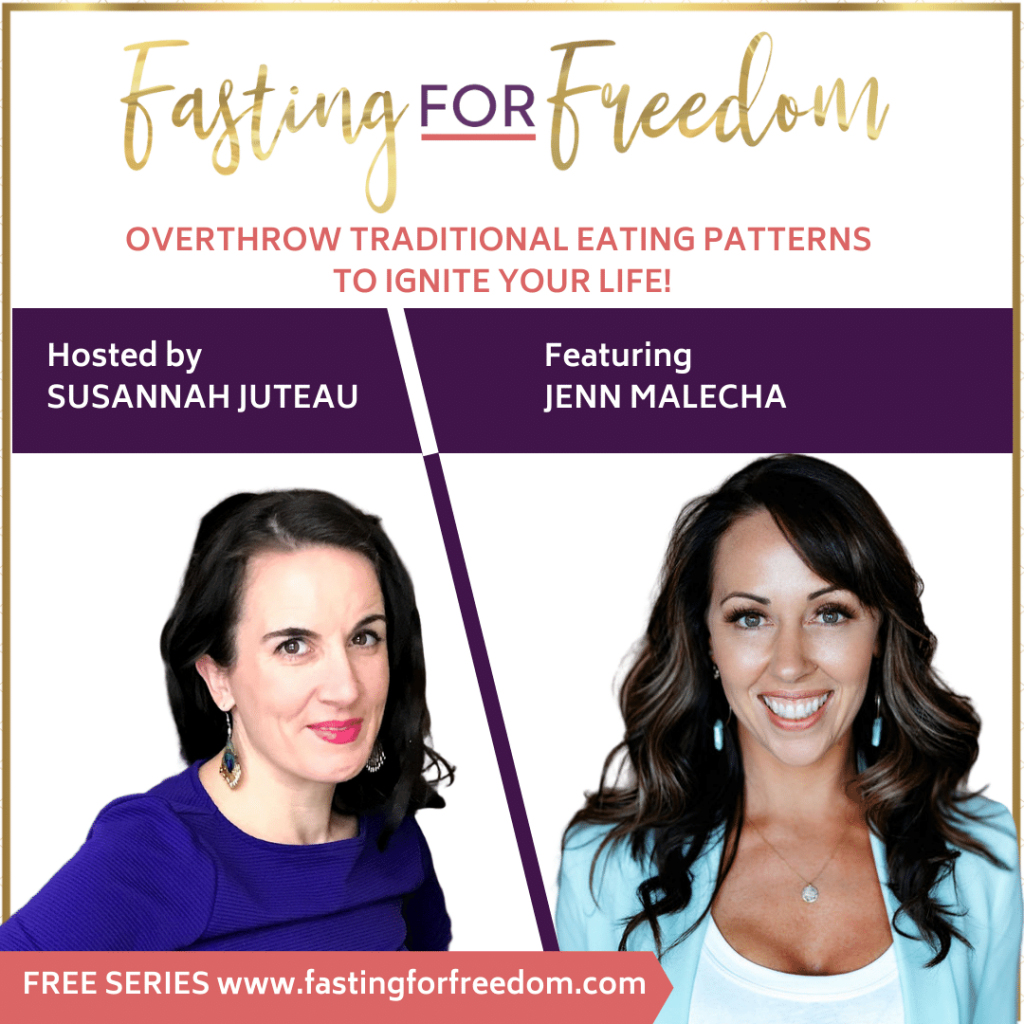When diet and exercise don’t work…

For years I counted calories, tried diet after diet and exercised excessively; yet I felt tired all the time and frustrated trying to shed pounds just like so many of my clients, until I found the missing pieces of the puzzle.
I hear so many people talk about their frustrations with their body, energy and their health – “I eat healthy and exercise so I don’t understand why…”
- I can’t drop weight
- I don’t have any energy
- My health isn’t improving
The truth is, there’s more to health and weight loss than just diet and exercise.
The body is a complex system and most people are ignoring some really important pieces of the puzzle, one of which is cleansing the body of toxins that contribute to a sluggish liver!
The liver plays a HUGE role in eliminating toxins, and when it’s overloaded with this work, it can’t convert hormones or regulate our metabolism like it’s supposed to in order for us to shed pounds and have energy.
To help you tackle this piece of the puzzle, I’m hosting a FREE Online Workshop TODAY – The Daily Detox: No Juices, Gimmicks or Supplements Required!
Date: TODAY – Thursday, April 30th
Time: 5pm PST / 8pm EST
Location: REGISTER HERE
(If you can’t make it live, register to get the replay!)
Do you struggle with shedding pounds and feeling comfortable in your body?
I used to get so frustrated with the scale when I was counting calories and putting in hours of cardio. I would tell myself it was “just water weight” that I was hanging onto or that my genetics were holding me back. But the reality was the age-old strategy of calories in vs. calories out just wasn’t doing the trick.
So what gives? – at what point are diet and exercise not enough?
Age and genetics do play a small role, but I’ll tell you that I’ve seen many clients successfully lose weight at any age and with all different genetics.
So what’s happening with people like us who diet like crazy, go to Crossfit daily and who still don’t lose weight as we want?
When diet and exercise aren’t getting you results, you have to look at the other pieces of the puzzle, and quite possibly the biggest key player is your liver.
In this week’s video and blog, I talk more about the role your liver plays in weight loss and how to boost its function to shed those pounds.
We are exposed daily to high levels of toxins through food, water, air, home and personal care products. These toxins get filtered through the liver, kidneys, lymphatic system and are stored in fat tissue. Toxic build up prevents the uptake and utilization of nutrients, carbohydrates, and proteins.
When your liver is so busy working to filter out all these toxins it has very little energy left to filter blood, drugs and hormones let alone do its other job as a digestive organ – thus many find shedding pounds more difficult.
Your liver is also in charge of converting and excreting excess hormones. If liver function is sub-optimal, then hormones such as estrogen can build up leading to estrogen dominance, which can cause excess weight, hot flashes and an increased risk for cancer.
The liver is also where a huge chunk of thyroid hormone conversion takes place, and an imbalance in thyroid slows your metabolism resulting in weight gain.
If you’re exercising, your muscles need fuel and your liver helps produce that fuel, but a clogged liver won’t and when that happens excess glucose gets stored as fat.
Here are 10 common signs your liver needs cleansing:
- Abdominal bloating
- Menstrual irregularities
- Abdominal fat; pot belly; that “spare tire” effect
- Joint and muscle pain
- Low energy or fatigue
- Acid reflux/heartburn
- Body odor
- Overheating of the body & excessive perspiration
- Acne/Rosacea or itchy, blotchy skin
- Unexplained weight gain and inability to lose weight even with calorie restriction
Keeping your liver in working order is a matter of reducing it’s stressful toxic load AND supporting its natural detox ability. You can do this several ways…
- Reduce your exposure to toxins
- Eat powerful detoxifying foods; beets, grapefruit, dandelion greens
- Do a detox cleanse 1-2 times per year
If you’ve hit a wall with your body or suspect that your liver could use some love, then you are in luck!
You’re invited to cleanse your liver and feel like your best self again…
SEASONAL CLEANSE CHALLENGE ENROLLMENT IS NOW OPEN!! ENROLL HERE
This challenge will help you boost your liver function naturally using foods and gentle cleansing methods so that you can:
- Lose those stubborn pounds
- Boost your energy
- Enhance your hormones and overall health
This 28-day challenge starts May 14th, and you can participate for just $1 per day!
Summer is right around the corner so it’s time to get back on track, cleanse the Corona crap and get back to feeling like your best self.
Will you join me and many others to shed pounds and boost your energy naturally?
The Toxic Body Burden [important info]

We already live in a world where more and more toxins are being released into the environment every day, week, month and year- far more than we can even fathom, and our bodies have taken on a huge burden as a result.
With COVID-19, your toxin exposure has increased tenfold as a result of being confined inside more than before in addition to the heightened use of disinfectants and hand sanitizers.
The air inside your home alone is said to be up to 100% more toxic than the air outside due to paint, sealants, fire retardants and cleaning products.
In 2016, the Environmental Working Group (EWG) released a report from a year long study showing that 420 chemicals were found in the human body across different populations which are known or likely known to cause cancer.
Let me repeat that…420 chemicals which cause cancer have been found in our bodies.
Cancer might be the worst scenario regarding toxins, but what about what they do to your body on a daily basis?
Pesticides found in food and water have been linked to increases in weight and insulin resistance in children and rodents.
A classification of toxins called Endocrine Disruptors are known to disrupt the Endocrine System which houses your thyroid, adrenals, and other glands that regulate metabolism, growth, development, tissue function, sexual function, reproduction, sleep, mood and other bodily functions.
Toxins cause inflammation and dysregulate the immune system making you more susceptible to autoimmune disorders, other chronic diseases and illnesses such as colds, flus and allergies.
Exposure to Obesogen toxins cause cells that would become bones or other types of tissues to become fat, contributing to osteoporosis and making your body biased towards burning carbs instead of fat for fuel.
So are we doomed to be a society of sick and toxic people?
Not exactly.
You do have a built-in and very sophisticated detoxification system. Your liver, kidneys, lymphatic system and even skin are always working hard behind the scenes to flush out as many toxins from your body as possible.
However, your detoxification system and organs could use some support since they are being required to work harder than ever before with this increase in environmental toxins.
In this week’s video and blog, I dive into how these toxins are taking a toll on your health and the best way to support your built-in detoxification system so you can feel your best.
There are a lot of “detoxing” or cleansing programs on the market these days claiming to boost your energy and help you lose weight as a result of flushing toxins from your body.
But are these programs as effective as they claim to be, or are you just flushing your money down the toilet (literally)?
Let’s examine some of the biggest myths around detoxing your body of the toxic burden and what you should know or be doing instead…
MYTH #1 – Juice Cleansing Is The Best Way To Detox
FACT – It’s a waste of money if you’re not eating protein. Protein is required for your body to actually move toxic elements through the different phases of detoxification in order to eliminate them.
MYTH #2 – Diet & Exercise Are The Key To Weight Loss & Eliminating Toxins
FACT – Diet and exercise aren’t really enough. The liver is the powerhouse when it comes to eliminating toxins, regulating your metabolism and energy. You need to show your liver some love in order to get the results you’re looking for, and one of the best ways to support your liver is sleeping from 10pm to 4am.
MYTH #3 – Detoxing Requires Expensive Supplements
FACT – Supplements help but aren’t the ultimate answer. You have to decrease the toxic stuff coming in and increase the toxic stuff going out consistently. Otherwise supplements are just keeping you afloat, but never helping you to actually get ahead.
MYTH #4 – Detoxing / Cleansing Means Deprivation
FACT – No it doesn’t at all! There are simple ways to detox your body daily using food, water, sleep, exercise and at home liver supporting techniques that allow you to enjoy food and life.
Reducing your body’s daily toxic burden is fairly simple once you know how to identify toxins in your environment and by putting some simple healthy habits in place to support your body’s natural elimination process.
We could all use a serious toxin cleanse after being cooped up for so long during this COVID-19 quarantine.
And let’s be honest, your eating and drinking habits have probably been less than ideal these last few weeks. Summer is right around the corner so it’s time to get back on track, detox the corona crap and get back to feeling like your best self.
Attend my upcoming FREE webinar…The Daily Detox: No Juices, Gimmicks or Supplements Required!
Date: Thursday, April 30th
Time: 5pm PST / 8pm EST
Location: REGISTER HERE
During this webinar, I’ll be going into even more detail about how you can detox your body daily and naturally so you can unburden your body, boost your energy, shed some pounds and get back to feeling like your less toxic self again!
Plus, when you register for the webinar you’ll get my Toxins Checklist instantly!
P.S. For those who have been asking about the next Seasonal Cleanse Challenge, I’ll be revealing the enrollment dates during the webinar. There’s only 50 spots available on a first come first serve basis 🙂
10 tips to boost health that don’t cost a thing!

I realized this past weekend I haven’t been using any of this extra COVID-19 quarantine time to knock out projects around the house, and I find this fascinating. My guest room closet still needs to be organized, my broken suitcase still needs to be emptied and tossed away, and those plants I’ve been wanting to re-pot are still looking sad.
So what have I been doing?
With all this extra time on my hands lately, I’ve been revisiting some acts of selfcare that have fallen by the wayside.
This COVID-19 situation has been calling all of us to…
- Slow down
- Let go of being busy
- Look inward instead of out
- Be with yourself and those closest to you
- Practice patience and hold space for health
- Take time to create and contemplate what is really important
The world has almost come to a standstill giving you the time you’ve always wanted to focus on yourself and your health in so many ways.
If you’ve ever said…
I wish the world or time would slow down so I could (cook more, sleep, exercise, meditate, etc.)
OR
I wish I had more time to (fill in the blank)
Then your time is NOW. It’s a time of deep healing, if you choose to let it be.
There are plenty of things we can “busy” ourselves with but at the end of the day what does being busy really do for us. Does it build health or breakdown health?
Being in a constant state of busy-ness can actually lead to a decline in your health because your body can only heal in a relaxed state, and if you’re busy you’re not relaxed.
If there’s something this whole COVID-19 situation has taught us, it’s that life is precious, and one thing is for certain, having good health is the MOST important thing you could ever have.
In this week’s video and blog, I share 10 things you can do to boost your health today that don’t cost a thing, and that don’t require any special tools or a lot of time.
Some of the simplest acts can have the biggest impact on your health.
You don’t necessarily need the latest and greatest health gadgets, supplements or fad diets to improve your health and feel like your best self. To feel and look your best, all you need to do is reduce your body’s daily stress burden.
I know, easier said than done, right, considering all that is going on in the world. However, stress is the number one suppressor of your immune system.
Constant low or high grade stress disrupts the vital hormones that regulate your immune system and destroys your intestinal lining which is where 80% of your immune system lives.
You can reduce your body’s daily stress burden by minimizing exposures to stressors that you have more control over, such as:
- Sugar, processed foods, and inflammatory foods
- Toxins and chemicals in foods, cleaning and personal care products
- Intense exercise when your body is already depleted
That, along with activities to help you empty your stress cup daily for all the things that are outside of your control.
Here are 10 things you can do to empty your stress cup daily, boost your immune system and improve your overall health in so many ways, and that don’t cost you a single penny or require any special resources or a lot of time!
#1 Put Your Feet Up
Literally laying on the floor and propping your feet up against the wall or sofa positively impacts your health. It instantly reduces stress and increases blood flow to your organs for digestion and other essential functions. How easy is it to binge watch your favorite Netflix while laying down with your feet up?
#2 Gargle for Gut and Brain Health
Your Vagus nerve serves as the main communication center between your gut and brain so it’s important to keep it strong and working correctly. Take a moment after brushing your teeth to gargle water for as long as you can to strengthen the Vagus nerve so you can boost gut health and immune system, stimulate organs and brain function.
#3 Be Asleep by 10pm
Being asleep by 10pm maintains the delicate balance of your circadian rhythm, aka hormones so you can feel rested upon waking, have an abundance of energy, avoid food cravings and easily lose weight. Set an alert at 9pm to remind you to start preparing for bed so you can be asleep by 10pm.
#4 Go Barefoot
If you’re stuck at home, there’s no reason to put your shoes on. Having your bare feet directly connected to the ground helps you to release stress continuously, and if you can get barefoot outside even better! Spending just a few minutes barefoot in the dirt or grass helps you to detox harmful EMF’s and toxins you’ve been exposed to by being inside so much that overloads your immune system.
#5 Hug and Cuddle More
Physical touch releases the “love hormone” Oxytocin which reduces cortisol, your stress hormone, and it boosts feelings of wellbeing to help you keep a positive state of mind during these times. So squeeze your loved ones a few extra times per day to give your health a boost!
#6 Take A Cold Shower
This one probably sounds terrible, but it’s only for 2 minutes and you can do anything for 2 minutes to boost your health, right? Cold water therapy has been used for hundreds of years to boost health. It helps to strengthen the immune system, improve stress response, promote weight loss and more. Start with 1 minute working your way up to 2 minutes before turning on the heat.
#7 Diaphragmatic Breathing
This type of breathing has been shown to lower cortisol levels (aka stress hormone), lower heart rate (aka reduce stress), lower blood pressure and even help people cope with symptoms of post-traumatic stress disorder (PTSD). This breath is way easier to do than trying to say what it’s called, check out the Cleveland Clinic’s step-by-step instructions.
#8 Get Natural Light Exposure
Your body relies on the cycle of the sun to know what time it is and what it should be doing throughout the day. Have you ever wondered how your furry friends always know when it’s meal time? It’s because they have internal clocks like us so their bodies always know when it’s time to eat. Exposure to natural light, especially first thing in the morning is critical to keep your internal clock ticking correctly so your body can do its job to keep you healthy. If you live where it’s cold, sit next to a window while sipping your tea or coffee in the morning, even if it’s cloudy outside.
#9 Chew 20 Times
Did you know that digestion starts in the mouth, not in the stomach? We often rush to and through our meals not giving our body the time or space to properly digest food so we can absorb all of the health promoting nutrients it has to offer. Challenge yourself to chew every bite of food 20 times so you can digest food better, reduce bloating and increase absorption of nutrients to improve your health.
#10 Open Your Windows
The air inside your home can be up to 100% more toxic than the air outside due to hidden toxins in paint, furniture and cleaning supplies. Oxygen concentration levels are also lower inside than out, and Oxygen molecules are essential for every single function in the body. Fresh air helps the body to eliminate stress inducing toxins and increases oxygen levels in the blood so your body can function at its potential.
So which one of these 10 tips are you going to commit to doing today so you can boost your health and immunity?
Let me know by leaving a comment below
It’s the littlest things that can make the biggest difference to your health, as the saying goes “small hinges swing big doors.”
P.S. If you are ready to heal on a deeper level so you can feel like yourself again, schedule a complimentary Ideal Health & Weight Discovery Session with me here today!
How to shed pounds while you sleep

It’s been a crazy couple of weeks with COVID-19, how are you holding up? Please feel free to reach out to me if you need some connection, tips, tools or inspiration.
I’ve been going through the emotions myself. Some days everything seems perfectly normal and other days it’s like doomsday.
I’ve caught myself going to the pantry more than usual out of pure boredom, not sure exactly what I’m looking for, but I catch myself just in time. I’m doing my best to stay active and motivated when it comes to exercise, although I feel like a caged animal sometimes.
One thing is for certain though…
I’m determined NOT to gain the Corona-15.
Been there, done that as a freshman in college and once again when I was hit with toxic mold and Hashimotos a few years ago. There’s nothing worse than feeling like a foreigner in your body. We can distance or distract ourselves from what is going on in the outside world, but you have to live in your body every day.
The way you feel in your body affects everything about your life. It can either lift you up, help you get that new job or partner and make your dreams a reality or take you down a deep dark hole.
I know times seem tough right now, but life is always going to happen. Learning how to navigate it differently is what makes all the difference when it comes to your health and feeling like your best self.
It’s times like these, when food cravings are coming on strong and the motivation to exercise is running low that we have to learn to value sleep more than diet and exercise to keep your mind right and help you shed pounds at the same time.
Sleep may not look like the so-called “magic pill” that you’re looking for, but it plays a major role in the body’s ability to regulate blood sugar and therefore food cravings, inflammation and hormones – all of which can equate to pounds shed or gained.
In this week’s video and blog, I dive into more detail about how sleep can help you stop food cravings, balance blood sugar and hormones, and ultimately help you shed pounds.
A study in 2012 showed how inadequate sleep negatively impacts the ability of fat cells to respond to insulin, one of the hormones that regulates metabolism, weight and plays a major role in the development of diabetes.
Another study in 2017 also found a link between short sleep duration and an increase in the progression to diabetes. This makes sleep quality a key component in preventing or reversing insulin resistance, which also relates to risks associated with diabetes, overall weight loss and hormone balance.
We must learn to value sleep as much as we do diet and exercise.
When you get adequate and restful sleep, the body is able to restore and repair itself, your hormones can rebalance and nutrients can be absorbed and converted into useful tools.
When sleep is inconsistent, disrupted or short in duration, your body is not able to fully recover. Your circadian rhythm and cortisol balance becomes dysfunctional and a domino effect occurs in the body. Cortisol regulates how your body uses insulin and the availability of glucose (sugar) in the body for energy.
Staying up late at night or not getting a good night’s sleep disrupts your cortisol balance and energy leaving you searching for energy via food, queueing the food cravings!
To balance your energy, blood sugar, avoid cravings and promote weight loss it’s ideal to be asleep by 10pm most nights of the week (5 out of 7).
I instantly pack on the pounds if I don’t follow this sleeping guideline, and my clients instantly shed them when they create more supportive sleep routines. I’ve had clients lose 30 pounds without exercising just by changing their diet and sleep routines.
If you’re a so-called “night owl”, I’m calling your bluff. I’ve yet to meet a person who doesn’t feel more energized, balanced and better about their body when they are sleeping according to their body’s natural circadian rhythm.
I recently kicked off a 10-day sleep challenge on Instagram and Facebook to help you prioritize sleep so you can increase your energy, stop food cravings, keep your hormones balanced, avoid putting on the Corona-15 and shed some pounds!
By participating in the challenge, you could win a FREE DUTCH Cortisol & Hormone Test plus Recommendations Session with me ($750+ value).
Here’s a recap of some of the sleep tips I’ve shared in the challenge so far to help you shed some pounds:
- How to improve your sleep and energy with natural light
- Tips to create your dream sleep routine
- Ways to create a sacred space to support high quality sleep
- How to stop getting up to pee in the middle of the night
It’s not too late to participate, follow me on Instagram and/or Facebook to see all of my challenge posts and to participate.
With most places shut down for quarantine and social distancing, there’s no excuse to stay up, so why not use this time to get to bed early, boost your health and feel better in your body!
If you want to get your hands on the right lab tests and resources so you can find the missing pieces of your health puzzle and feel like yourself again, schedule a complimentary Ideal Health & Weight Discovery Session with me here today!
4 tips to stop food cravings [right now]

Have food cravings been creeping up on you while being stuck at home for this COVID-19 quarantine?
Mine have. So this week I want to share 4 tips to stop food cravings in their tracks so you don’t put on the Corona 15. As a bonus, these tips can actually help you shed pounds too so you’ll feel great and be ready for summer once this thing is over.
Before I dive into my 4 tips to help you stop cravings right now while you’re stuck at home in quarantine, I want to quickly tell you about two other things that I think will help you right now too….
- I kicked off a 10-day sleep challenge today to help you increase your energy, improve your health and boost your immunity. By participating in the challenge, you could win a FREE DUTCH Hormone Test and Recommendations Session with me (($750+ value). Follow me on Instagram and/or Facebook to see today’s 1st challenge post and to participate.
- Join me LIVE TODAY on Instagram at 1pm PST / 4pm EST with emotional eating expert coach Tricia Nelson for strategies to stay sane around food when you’re stuck at home so you don’t eat the house!
Ok onto the tips to stop food cravings…
Let’s start by understanding what causes cravings in the first place and why being stuck at home is triggering them.
Some of the most common food craving triggers include:
- Eating sugar and carbs that spike your blood sugar causing you to crave more of them when your blood sugar crashes
- Staying up late at night or not getting a good night’s sleep which disrupts your hormone balance and energy leaving you searching for energy via food
- Not drinking enough water or getting enough electrolytes to keep you hydrated – cravings can be a sign of dehydration
- Feeling bored, anxious, emotional, overwhelmed or deprived
Being isolated at home sets the perfect scene for all of these things. There are less boundaries around your routine and food making it easy to snack throughout the day, and of course the best snacks are ones higher in sugars and carbs.
Are you staying up late binge watching your favorite shows or getting sucked into the news and sleeping then sleeping in? Are you running out of things to do so boredom is getting the best of you? Are your emotions running high as you anxiously wait to see how this all pans out? Or you’re doing so much for others forgetting to fill up your cup?
All of us are lacking structure a little bit because our typical daily routines have been interrupted. Meal times, bed times and the general flow of life have been impacted, including when and how much water you are drinking.
Now that you know the most common triggers for food cravings and how your current quarantine situation can aggravate them, you can start to examine which ones are true for you and take empowered action to stop them in their tracks.
In this week’s video and blog, I share 4 tips to stop food cravings in their tracks so you don’t put on the Corona 15.
First let’s explore the food you’re eating because this usually results in the quickest fix for cravings.
When you eat the wrong ratios of proteins, carbs and fats for your body, it can leave you feeling:
- Tired, anxious, irritable or needing to nap
- Snacky, bloated, heavy or craving for sweets
- Brain foggy, wired but tired or physically full and still hungry
These are all signs that your food ratios are off, your blood sugar is likely not balanced as a result, and the nutrients in the food you ate were inadequate.
When you’re eating the right ratio of protein, carbs and fats per meal you will:
- Be able to go 3-5 hours or more without feeling hungry or needing to snack
- Have energy for hours and feel recharged
- Think clearly, feel uplifted and be more positive
Figuring out your food ratios is actually pretty simple. All you need to do is:
- Tune into your body 30 minutes to 2 hours after eating
- Notice how it’s responding to what you ate
- Adjust your food ratios until you get the perfect response!
To help you figure out what ratios are right for your body to avoid food cravings, click here to get my Food & Body Language Log.
Adding 1-2 tablespoons of olive oil to your meals by drizzling it over veggies, meat or salad is an easy way to increase your intake of healthy fats to balance your blood sugar, keep you satiated for longer and fend off cravings.
Next let’s address sleep because you have to learn to value sleep more than diet and exercise. If you’re not going to bed at the right time or getting a good night’s rest, it basically cancels out your healthy eating and exercise efforts.
To balance your energy, blood sugar and avoid cravings it’s ideal to be asleep by 10pm most nights of the week (5 out of 7).
Check out the sleep challenge I started today on Instagram and/or Facebook for pro tips to help you create a supportive sleep routine to stop cravings.
Once you’ve dialed in your food ratios and sleep and if you’re still experiencing cravings, it’s time to check your hydration.
Recommended water intake is half of your body weight in ounces; if you weigh 200 pounds then you should drink at least 100 ounces of water per day. You’ll want to add an additional 8 ounces of water for every 30-minutes of exercise you do or caffeinated drink you have in order to make up for the water you lose from them.
Drinking water is just one part of staying hydrated. In order to hold onto water, you need electrolytes.
If you’re eating a lower carb diet or having a hard time sourcing veggies then supplementing with electrolytes is crucial. You can get more electrolytes by generously adding Himalayan or sea salt to your food or water, or by adding an electrolyte supplement such as LMNT electrolytes.
Lastly, of course emotions are running high or boredom might be getting the best of you with what is going on in the world which can lead to food cravings.
So the best thing to do is Stop & Shift…
- When a craving pops up STOP and check in with yourself before giving in
- Ask if you’re really hungry or is there something else you want or need
- SHIFT your attention to something else for 20 minutes; journal, dance, meditate, breath work, exercise, take a bath, read, call a friend etc.
And after you shift, evaluate if the hunger is still there. If it is, honor it and if it’s not, congratulate yourself on overcoming it and recognize what you probably need more of instead in your life.
What was the most insightful or helpful tip for you? Hit reply and let me know!
If you’d like to get your hands on the right lab tests and resources to find more missing pieces to your health puzzle so you can feel like your best self, schedule a complimentary Ideal Health & Weight Discovery Session with me here today!
Healing through COVID-19 [take action]

This by far has been the oddest start to a year, let alone a decade. In the midst of the COVID-19 chaos and as I turned 37 on Monday, I have been reflecting a lot on what this all means for me, you and the world around us.
Life gives us exactly what we need when we need it, we just have to be open to receive it.
The recent events are forcing change. They are forcing us to change the way we look at the world, the way we look at our health and what we prioritize in our lives.
What’s important to you?
For some it has been toilet paper and for others it’s been making sure they have high quality food in the fridge.
While I was re-evaluating my priorities with the recent full moon on March 9th (noted as a day to release things), the intention I set was…
“I let go of busy-ness to hold space for my intuition, creativity, health & happiness”
Little did I know the COVID-19 situation would explode just a few days later and it seems this is exactly what it’s calling us to do…
- Slow down
- Let go of being busy
- Look inward instead of out
- Be with yourself and those closest to you
- Practice patience and hold space for health
- Take time to create and contemplate what is really important
Interestingly, these are also basic practices that help you to build and maintain your health, and they were pivotal parts of my health journey that helped me to reverse Hashimotos, balance my hormones, restore my energy and get back to my ideal body.
Part of the reason why people get sick is because we are so busy. Think about how many times you or people you know have…
- Come to work sick
- Pushed through the pain
- And kept going till burn out
All because there was “too much to do.” And all of which suppresses your immune system, making you susceptible to the common cold, flu, chronic illness and pandemic type viruses such as COVID-19.
Your body can only heal in a relaxed state.
If you’re always on-the-go, when does your body have time to heal and to strengthen its defenses?
While being quarantined to your home doesn’t sound like the most ideal situation, maybe it’s what we all need right now in order to not only prevent the spread of the Coronavirus, but to also allow a deep healing to happen that we wouldn’t have otherwise permitted.
In this week’s video and blog, I’m giving you tips to help you make the most of this Coronavirus situation so you can come out of it healthier than ever before!
Word on the street is the people with the highest risk for contracting Coronavirus are immunocompromised.
Immunocompromised simply means having a weakened immune system, it doesn’t mean you have to have a more chronic illness such as an autoimmune condition. In fact, a weakened immune system can occur over time from the accumulation of simple stressors such as:
- Mental or emotional stress
- Eating low quality foods or drinking alcohol
- Going to bed late or not sleeping through the night
- Toxins you’re exposed to at home, work or in your food and products
- Over exercising when you’re already stressed or exhausted
It wouldn’t be crazy to say that all of us have some level of a weakened immune system given this list, and especially right now with stress regarding the state of the world.
The good news is there are plenty of simple things you can do to offset the accumulation of stressors to not only boost your immune system but also to build your health.
Here are my top 5 tips for boosting immunity and building health:
- Avoid inflammatory and toxic foods such as gluten, dairy, sugar, soy and alcohol
- Be asleep by 10pm OR earlier – every hour before 12pm is worth 2 hours of rest
- Move your body daily at a moderate intensity to break a sweat without overdoing it
- Do the 557 breath 10x before meals – inhale for 5 seconds, hold for 5 and exhale for 7
- Get outside daily for fresh air and sunlight to boost detoxification and balance your body’s natural rhythm
Doing these things doesn’t take much time, energy or resources so even if you are quarantined they are within your reach and doable.
And if I was to pick ONE thing for you to focus on right now out of all of them, it would be sleep. We have to learn to value sleep more than diet and exercise, especially during times like these. With everything being closed at the moment, there’s no reason to go out and stay up late.
Getting to bed before 10pm positively impacts your immune system, hormone balance, energy, and overall health on a huge scale.
To help keep you motivated, focused on your health and accountable to getting proper sleep, I’m going to be hosting a sleep challenge on my Instagram and Facebook next week that you can participate in. All you have to do is follow me on Instagram and/or Facebook.
In addition to the challenge, I’ll be posting regular tips, resources and bits of inspiration you can use to support your health.
I want to be a resource and of service to you during this time. Please don’t hesitate to message me if you need a word of advice, encouragement or resources to help you support your health.
This too shall pass and we’ll get through it together.
Why intermittent fasting doesn’t work…

If you caught my recent interview on the Fasting for Freedom series, this subject might come as a surprise to you.
In the series, I shared my personal journey with intermittent fasting and how it didn’t initially work for me, and how common this is for many people who try it.
What works for one person will not necessarily work for you.
This is why you, or someone you know, may have tried eating Paleo, Whole30, gluten free, Keto or (insert diet of your choice) didn’t work, yet other people are getting amazing results from it.
At the core, intermittent fasting is a highly effective tool that has been used to improve health for centuries. Fasting has been used for ages in eastern philosophies of medicine to help reverse or prevent health conditions such as cancer, diabetes and other chronic diseases.
If we think about fasting from a primal or ancestral standpoint, it has been around basically since the beginning of mankind. As hunter-gatherers, our primitive ancestors frequently went without food for periods of time in between successful hunting trips and during times of famine when food sources were low or hard to come by. They didn’t have the luxuries of fast food drive-thrus on almost every corner or food at their fingertips like we do today.
However, intermittent fasting may not work for everyone, at least not right away, and in some cases it could be causing more harm than good.
Fasting may not be working for you if:
- You have existing hormone imbalances (thyroid, estrogen, testosterone, cortisol, etc.)
- You currently suffer with sleep issues
- You have underlying vitamin and mineral deficiencies
- Your liver is already sluggish or overloaded
- You have metals or other toxins built up in your body
- You avoid salt or don’t eat enough of it
Countless health- coaching clients have come to me frustrated with the lack of results they are getting with intermittent fasting and other diet approaches.
It’s not the diet or the intermittent fasting that’s not working.
There’s something going on under the hood rendering the diet ineffective.
In this week’s video and blog, I share more insights about why intermittent fasting may not be working for you and what you should do so it will.
Think of intermittent fasting like training for a marathon: you need the right shoes, gradual training runs that lead to longer ones over time, proper hydration and food to refuel, and recovery time to make it to the finish line.
We want to think of the body as a well-oiled machine that is ready to adapt to anything we throw at it, but that’s generally not the case, considering all the variables that impact our health in this modern day world.
With most diet trends, people have a tendency to dive all-in without considering if their body is ready for it, and when it “doesn’t work,” they give up.
Often it’s not the diet that didn’t work, but something else under the hood that got in the way. This is why it’s always better to test, not guess, in order to figure out exactly what is right for your body so you don’t go spinning your wheels, wasting money or time on failed attempts or health improvement strategies that aren’t right for you.
Assess if intermittent fasting will work for you and properly prep for it…
Test, don’t guess.
It’s better to know about any underlying hormone or nutrient imbalances before you dive into fasting. At a minimum, check your thyroid, cortisol, estrogen, testosterone and melatonin levels along with your vitamin and mineral balance before starting a fasting routine.
But you should know that typical blood tests won’t tell you all you need to know about your hormones. Get the truth about lab tests in this webinar I did.
If any imbalances exist, lay the foundation to reverse them with a therapeutic diet, adequate sleep, appropriate exercise, stress reduction and nourishing supplements before jumping into fasting.
Start in small chunks.
Don’t go for the gold right from the get-go. Start by making dinner your last meal, fasting overnight, and gradually extending out the time you eat breakfast in the morning a few days a week. I typically stop eating by 8pm and don’t have my first meal until 9:30 or 10am the next morning resulting in a 14 hour fasting period. As your body adapts, your energy will improve, letting you know when you can extend the length of your fast..
(NOTE: Women’s hormones are particularly sensitive to food deprivation so consider intermittent fasting every other day instead of daily, and not during ovulation or a few days before your period starts.)
Salt and supplement.
When you’re avoiding food, you’re also avoiding access to nutrients so it’s essential to supplement what you’re missing. Taking a high quality multivitamin and mineral complex supplement on a daily basis is a good idea in general because food these days is just less nutrient dense than before (even the organic stuff).
If you’re avoiding food all together for the purpose of fasting, supplementing with vitamins and minerals will help to keep your hormones happy, your energy balanced and will support the process of fat adaptation. Our ancestors salted meat to cure them for food storage and ate every part of the animal (organs, cartilage, etc.) so the nutrient values in their bodies were much higher than ours, even when they were forced to fast.
I take LMNT electrolytes at least once a day to ensure I’m getting enough minerals and electrolytes to stay hydrated.
If your energy tanks or your sleep goes south while trying intermittent fasting, you definitely should stop and investigate what’s going on under your hood. Those are two key signs something isn’t right and intermittent fasting may not be right for you right now.
If you want to assess if intermittent fasting will or won’t work for you, then schedule a complimentary Ideal Health & Weight Discovery Session with me here today!
Fasting for freedom!

Food used to basically rule my life in so many ways, but it doesn’t anymore and I want to fill you in on my secret as to why, so you can find your food freedom too.
First, let me rewind for a minute and tell you where this all started…
In 2001, I went off to college pursuing a career in Sport Psychology. About halfway through my undergraduate I decided the Athletic Trainer to Sport Psychology route wasn’t for me, so I changed my major to an emphasis in fitness nutrition, and I landed my first job as a personal trainer right after graduating.
All throughout college, everything I learned about health centered around diet and exercise. And even to this day the old paradigm of calories-in versus calories-out is still considered the equation for weight loss and good health.
I was also taught how eating small meals every two hours fueled the body and fat loss, and how many servings of each food group should be consumed based upon government recommended guidelines (aka the food-guide pyramid now known as My Plate).
So as a personal trainer straight out of college, of course I thought I knew all there was to know about diet, exercise, weight loss and health, and I followed what I had been taught.
And all of a sudden food became the boss of me.
I planned my personal training client schedule around having to eat every two hours, not just because I thought it was what I was supposed to be doing but also because I found myself hungry every two hours. If I didn’t eat on time I would become hangry.
As a result, my whole life started to revolve around food preparation. I spent hours going to the grocery store, cooking meals for the week, and portioning out my meals and snacks for the week on Sundays. I basically would devote almost half the weekend to food prep.
It was exhausting, monotonous and time consuming, to say the least.
Fast forward to now…
I recently completed not one, but 3 separate 72-hour fasting periods to heal my gut and take my health even higher!
Yes, you read that right, I went 3 days without eating on 3 separate occasions. Food is no longer the boss of me and I have the ultimate food freedom!
Fasting is an incredibly effective tool that has been used for ages in eastern philosophies of medicine to help reverse or prevent health conditions such as cancer, diabetes and other chronic diseases.
So naturally I was stoked when Susannah Juteau asked me to be on her Fasting For Freedom Series to share the wealth of health knowledge with the rest of the world so you could find your food freedom too!
Fasting isn’t right for everyone and in some cases it can produce more negative health side-effects than good.
Fasting may not be right for you if:
- You have an existing hormone imbalance (thyroid, estrogen, testosterone, cortisol, etc.)
- You currently suffer with sleep issues
- You have underlying vitamin and mineral deficiencies
- Your liver is already sluggish or overloaded
- You have metals or other toxins built up in your body
- You avoid salt or don’t eat enough of it
In my expert interview on the Fasting For Freedom Series, Susannah and I discuss safe ways to approach fasting to make sure you don’t wreak havoc on your hormones and so you can reap all the health benefits that fasting has to offer.
You can watch my interview as part of the 11 Day Virtual Series ‘Fasting for Freedom: Overthrow traditional eating patterns to ignite your life’ starting Monday, March 2nd.
Get your all-access pass to the series here, and get all the info you need to fast for your freedom!
Are eggs bad for you? [news flash]

Eggs have received a bad rap and been misunderstood for a long time. For example…
What came first, the chicken or the egg? (LOL, just kidding but hopefully that gave you a laugh)
But for real though…
Have you ever wondered why eggs are located in the dairy section at the grocery store or on food guides when they actually come from chickens, not cows or other animals that produce milk (aka dairy)?
Why aren’t eggs located in the meat department with the rest of the animal proteins?
And how many times have you heard eggs are bad for you, or that you should only eat egg white and avoid the yolks?…especially if you have high cholesterol?
These are some of the most common myths and misunderstandings around eggs, and today I want to clear them up for you so you can eat eggs with peace of mind and reap all of the nutritional benefits they have to offer so you can lose weight, have more energy and feel like yourself again.
Let’s start by busting the biggest egg myth…
A recent study involving 177,000 people over 50 countries found NO SIGNIFICANT correlation between eggs and blood cholesterol levels, mortality or cardiovascular events.
That’s HUGE!
You’ve likely been told your whole life to watch how many eggs you eat because it could lead to high cholesterol, and now you know it’s not true.
The idea that eggs could single-handedly increase cholesterol has always been a silly notion to me because the body is a network of complex systems. When you eat something it gets deconstructed into a million tiny little pieces of nutrients that are dispersed throughout the body and used as building blocks to make cells, tissues, organs and bones.
And cholesterol is no exception to this rule. Here’s what really happens to cholesterol when you consume it…
Sounds pretty complex right?
In this week’s video and blog, I want to clear up confusion around cholesterol and eggs so you can eat them with peace of mind and reap all of the nutritional benefits they have to offer you to boost your energy, lose weight and feel great.
Now that you can confidently eat eggs without worrying about your cholesterol levels, here’s why you should make them a part of your regular eating routine…
Eggs contain some of the highest levels of Vitamin K2 which actually protects you against heart disease. In fact, K2 is the single most important nutrient preventing calcium deposits on your artery walls.
Egg yolks also contain more choline than any other food. In comparison, egg yolks have ten times more choline than broccoli and Brussels sprouts. Choline prevents fatty liver disease, dementia and other brain-related conditions and it’s important for memory, mood, muscle control, and other brain functions.
Eggs also top the charts for Biotin, a nutrient needed to support all cellular membranes. In fact, deficiencies in Biotin can contribute to depression and issues related to your skin, hair, and nails.
Egg yolks are possibly one of the most nutrient dense foods in the world. They are right up with liver, but I bet you’d rather eat egg yolks over liver…am I right???
Yolks contain vitamins such as A, D, E, K and B6 and nutrients such as Iron, Zinc, and other essential fatty acids. Egg yolks carry a larger percentage of Choline, Biotin, Calcium, Phosphorus, Folate and Pantothenic Acid.
As you can see, eggs are rich in a LOT of nutrients that support every function of your body, giving it the fuel it needs so you can lose weight, have more energy and feel great.
There are only two guidelines you should follow when eating eggs…
- Choose organic, pasture-raised eggs to avoid added hormones and support humane farming practices
- Consider a food sensitivity test to make sure they are right for you and not reactive
I often see people struggling with weight loss, fatigue, thyroid and other hormone imbalances because they aren’t getting enough eggs or naturally occurring cholesterol in their diets.
Cholesterol is a vital nutrient needed to make hormones such as estrogen, testosterone, progesterone, cortisol, DHEA and even thyroid. Without this nutrient supply your hormones will run dry.
So don’t fall for the egg and high cholesterol trap. Eat your eggs confidently knowing they are doing your body good!
P.S. If you’d like to get your hands on the right lab tests and resources to see if eggs are right for you so you can feel your best, click here to schedule an Ideal Healthy & Weight Discovery Consultation
#TBT What to do when sh*t happens…

If you’ve been following my Instagram at all you know I’ve had a really rough couple of weeks with my fur/child, Cliff, being in and out of the emergency room and having repeated surgeries.
We still don’t know exactly what’s wrong with him and some of what is happening to him is completely out of my control.
These past few weeks have been physically and emotionally exhausting.
But this is life; sh*t still happens no matter how healthy or safe you try to be. The events of these last weeks have been a great reminder for me on how far I’ve come in my health journey and what to do when sh*t happens.
So this week’s #throwbackthursday blog is full of lessons I’ve learned about what to do when sh*t happens, so you’ll know what to do too when sh*t happens in order to feel your best.
***
Let’s face it, sh*t happens and you can’t always avoid it. There will always be traffic, an angry boss, deadlines that won’t get met no matter how hard you try, the loss of loved ones, stumbles and falls.
Last week I was stuck in a sh*t storm…
I was on my way home from Peru and everything was smooth sailing on my flight from Lima to Miami. So good, in fact, that we actually landed 45 minutes early. After being away from home for 11 days, I was giddy to get home, so I decided to jump my flight.
I paid $250 to catch an earlier flight at 3:45pm instead of waiting around until 7:45pm so I could get home 2 hours early and slide into bed before my 10pm bedtime.
Sounded like a great idea, right? I thought so, until things went all wrong.
My new flight connected through Dallas. The plane boarded on time. “So far so good” is what I texted my husband about 5 minutes too early. Just after I hit “send,” the pilot announced there was a hold up on the runway and we would be taking off as soon as possible… 40 minute later we finally took flight.
This is when the sh*t started to hit the fan.
I nervously watched the time go by, hoping, praying, wishing and thinking all the positive thoughts possible that we would make up time in the air and I would make my tight connection in Dallas.
Just as we landed in Dallas, there was a glimmer of hope! A woman next to me said her husband had just messaged her that all flights in Dallas had been grounded until 7:30pm for some reason, meaning my connection was still on the ground.
I grabbed my bag and ran across the airport with about 20 other people trying to catch the connection to San Diego. We got to the gate to see the flight had been delayed and a representative was still at the counter – I felt relieved!
To our disappointment, the plane had already closed up boarding and no one else was getting on.
In that moment I had two choices. I could…
#1- Raise hell, scream, yell and demand for the plane to let us on as most of my passenger peers did around me.
#2- Evaluate what was in my control, what wasn’t, and make sure my wellbeing was the priority.
I opted for option number two.
Having been in a similar situation a few years ago, I knew I had no control over opening up the plane again. The old me, back then, argued with the airline representative which did nothing for me except raise my stress levels, drain my energy and leave me feeling fatigued and hopeless.
This time I chose differently. I chose my health.
In this week’s video and blog, I share more about how to navigate life when sh*t happens to better support your health.
Just because I’m a health-minded person doesn’t mean I’m immune to sh*t happening in my life. I’ve had my fair share and I still get dished some from time-to-time.
How we choose to navigate the sh*t is what makes all the difference in the world to our health.
The choices we make around food, lifestyle and behavior all influence our genetic makeup and therefore our health. We might have been given a set of genes, but we have the ability to turn them on or off based on how we choose to live our life. We know this based on the study of epigenetics.
As shown in this study, mice raised by stressed mothers are more likely to be stressed themselves. Stress causes changes in DNA that affect the receptors for cortisol, our major stress hormone. The way we handle stress not only impacts our genes but also the genes of our offspring.
It’s funny sometimes how we actually create more stress in our lives than necessary. We wait until the last minute to do something (procrastination!) like filling up our gas tank as my friend Molly Hamill just posted about. We take on more than we can handle (too much on our plate). We think we can save everyone or change them for the better (martyr or healer mentality). We argue our point of view to death just to prove ourselves right even if we might be wrong.
And all for what exactly? To feel exhausted, fat, tired and sick more than we would like to.
It’s time to put all of that into perspective and realize that each action you take can either help or hinder your health. Which do you choose?
This became so clear to me after the first time my mom had a near death experience over 7 years ago. I ran myself ragged trying to save her, arguing with the doctors, trying to control everything and putting too much responsibility for work, home and her on my plate.
She lived, but I barely did. I was a shadow of health that I used to know, and it took quite some time for me to recover from all of that. And not one thing that I did changed the outcome of what happened. It was all fate.
Through all of that, I realized the only control I had was over myself and my health.
Since then, part of improving and maintaining my health has been learning how to let go of the things I can’t control and controlling the things I can. This can be tough when it means making myself a priority over even my loved ones, but I know it’s necessary for my own survival.
Being able to identify the burden of stress on the body at any point in time and knowing how to take action to reduce it, is the main message I teach all of my health-coaching clients and one that I practice personally.
Whether that’s by taking action to:
- Eat in alignment with what your body needs
- Get adequate sleep and rest over all else
- Turn down the exercise intensity, even when your ego says “no”
- Support the body with proper supplements until it can support itself
- Notice when a situation is causing emotional or mental stress and changing course
- Reduce toxic exposures as much as possible and enhance the body’s natural detox capacity
Back to that moment when I missed my flight connection…
There was nothing I could do about that, but I was able to assess my situation and recognize the possible burdens of stress my body was about to face: not being home on time for a healthy meal, not being in bed at a reasonable hour plus the mental/emotional aspects of being stuck waiting for another plane.
And that wasn’t even the end of it. My rescheduled flight for 10:30pm was cancelled, the airport hotel was sold out so I had to stay somewhere 10 miles away, I woke up at 5:10am to a voicemail about my rescheduled 6:55am flight being cancelled to finally make it on a 7:10am flight home through LAX to San Diego.
And I didn’t lose my sh*t. Not even once.
So after 36+ hours traveling, one missed connection, two cancelled flights and 5 hours of sleep in a last-minute hotel, how did I stay sane and healthy this time? My priorities were:
- Sleep
- Clean food
- Meditation
Those were the 3 things I could control and that would have the greatest positive impact on my well-being.
I knew eating clean food would keep my mind clear and my body nourished. Sure, it would have been easy to eat anything in my immediate sight but the downside would have been brain fog, bloating and inflammation.
When I’m sleep deprived I become irritable and susceptible to getting sick, so getting sleep was a must. Not standing around arguing about a missed or cancelled flight.
And to keep myself grounded, emotionally stable (minus the few tired tears I shed on the phone telling my husband I wouldn’t be home), and rational to make quick decisions about my next move, I knew I needed to decompress with some deep breathing in the moment and some meditation before bed.
All-in-all I made it home in one piece without an ounce of jet lag or regret.
Good health is the relationship that we have with our mind and body, and the actions that we take based upon that.
***
As a Functional Health Practitioner and coach, I not only use lab testing, diet, rest, exercise, supplements and stress reduction techniques to help my clients achieve their results, but I also infuse transformational coaching methods to change their behaviors and help them embrace health as a way of being.
If you’re looking for guidance on how to improve your health and you’re ready to invest in your health and yourself, then schedule a complimentary Ideal Health & Weight Discovery Session here today!

